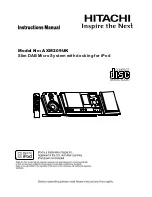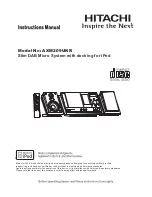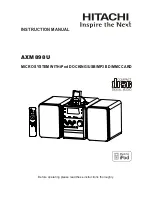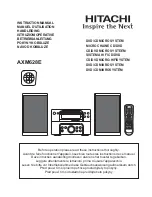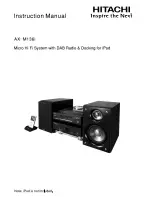
Chapter 22: Events
195
Chapter 22: Events
This chapter introduces the Events window, and explains how
to use the Event List.
Introduction
A D-Show
event
consists of one or more
triggers
, which are con-
figured to cause one or more
actions
to occur.
Events can be very simple, such as a Footswitch input trigger-
ing a Recall Next Snapshot command. This is an example of a
single
trigger
(a footswitch input) causing a single
action
(Recall
Next Snapshot).
Events can also be quite complex and involve multiple trig-
gers and actions. For example, a single event can be defined so
that moving a specific fader above and/or below a certain level
sends a General Purpose output, recalls a specific snapshot
and
mutes one or more channels. Multiple triggers can be consid-
ered conditionally using the available logic operators AND,
OR, and XOR.
Terminology
Event
A defined combination of one or more triggers and one
or more actions. Each event serves as a type of software
“macro” in which you establish a cause-and-effect relation-
ship between one or more console functions (triggers) and
their results (actions).
Trigger
A conditional check used to fire an event.
Action
A console function, mode or other response resulting
from an event being triggered.
GPI
General Purpose Interface, also commonly known as a
logic interface. D-Show Profile provides eight GPI inputs, and
eight GPI outputs.
Open
GPI input or GPI output is floating, or at its reference
voltage.
Closed
GPI input or GPI output is closed.
Footswitch
Footswitch ports are functionally identical to GPI
inputs and share all of the same properties and behaviors.
Important Information about Snapshots and
Events
Because Events can trigger snapshot recalls, and because snap-
shot recalls can trigger other events, it is possible to create
logic “feedback loops.” For more information, see “Avoid
Feedback Loops” on page 203.
D-Show and D-Show Profile Support
The following describe differences in Events support and ca-
pabilities between D-Show Profile and D-Show consoles:
GPI
• The D-Show Profile console features eight GPI Inputs and
eight GPI Outputs, in addition to two Footswitches
• The D-Show console has two Footswitches but no GPI in-
puts or outputs. GPI appear as disabled within the D-Show
software.
Function Switches
• The D-Show Profile console provides eight function
switches
• The D-Show console provides only four function switches
For examples, see “Default Settings, Templates and Exam-
ples” on page 204.
Summary of Contents for D-Show Profile
Page 10: ...D Show Profile Guide x ...
Page 11: ...Part I Overview and Installation ...
Page 12: ......
Page 16: ...D Show Profile Guide 6 ...
Page 32: ...D Show Profile Guide 22 ...
Page 33: ...Part II System Description ...
Page 34: ......
Page 50: ...D Show Profile Guide 40 ...
Page 58: ...D Show Profile Guide 48 ...
Page 67: ...Part III Signal Routing ...
Page 68: ......
Page 94: ...D Show Profile Guide 84 ...
Page 102: ...D Show Profile Guide 92 ...
Page 110: ...D Show Profile Guide 100 ...
Page 134: ...D Show Profile Guide 124 ...
Page 135: ...Part IV Processing ...
Page 136: ......
Page 144: ...D Show Profile Guide 134 ...
Page 171: ...Part V Shows ...
Page 172: ......
Page 180: ...D Show Profile Guide 170 ...
Page 204: ...D Show Profile Guide 194 ...
Page 227: ...Part VI Specifications ...
Page 228: ......
Page 236: ...D Show Profile Guide 226 D Show Output Signal Flow Diagram Version 1 3 07 07 05 ...
Page 245: ...Part VII Reference ...
Page 246: ......
Page 258: ...D Show Profile Guide 248 ...
Page 269: ......












































